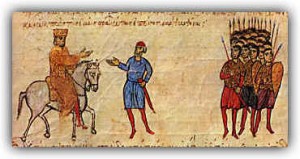If Basil I was illiterate how good could Byzantine education be?
 Nick asks how good the Byzantine educational system really was if the founder (Basil I) of its most illustrious dynasty was illiterate.
Nick asks how good the Byzantine educational system really was if the founder (Basil I) of its most illustrious dynasty was illiterate.
The average literacy rate for Byzantium probably averaged around 30%- which may not seem particularly high by contemporary standards, but for comparison’s sake is higher than 18th century France. Of course there were the inevitable ups and downs- the 7th and 8th centuries are known as the ‘Byzantine dark ages’ where the literacy rate probably plunged well below 30%- but on the whole imperial subjects were better educated than their western brethren.
The fact that several emperors (Basil I and Justin I) were illiterate is not surprising considering the class they came from. They were both peasants (a swineherd and a shepherd), and as such had little time or money for school. Once they gained the throne, however, they made sure their successors had the finest education available- and the remarkable thing is just how good that education was. Justin was followed by Justinian and Basil by Leo the Wise, both famous for their scholarship and considered among the most erudite of rulers.
The fact that a good education was available was due in large part to the excellent university of Constantinople. When it was founded in the 5th century it had 31 chairs: 10 each for Greek and Latin grammar, 2 for law, 1 for philosophy and 8 for rhetoric. It was underwritten by the state and provided instant access to education for both genders of the nobility- during the latter half of the Macedonian Dynasty literacy among the aristocratic class probably was nearly universal.
The middle classes could also expect a practical education. Byzantine clerks, notaries, and accountants had several years of training and government officials could measure land with a small margin of error. Workmen routinely constructed items which were considered miraculous in the west- Thophilus’ famous elevated throne and golden lions that roared, a 9th century system of fire beacons that relied on synchronized clocks, buildings like the Hagia Sophia, aqueducts, silks, glass, and ceramics, as well as the famous silk industry. None of this would have been possible without a widespread specialized education.
The real question is how much the poor had access to any of this. The University of Constantinople was funded by the state even through the troubled ‘dark age’, but the vast majority of the imperial citizens lived outside the capital. In fact the lack of education in the countryside became somewhat of an issue for the imperial government. In their law codes both Leo VI and Justinian complain about the woeful state of ‘knowledge’ among peasants, and they authorized wills to be witnessed by ‘ignorant’ people if a literate one couldn’t be found. In 867 Basil I (who could certainly sympathize) ordered that fiscal documents should write out the fractions to be more easily understood by peasants.
It’s tempting to think that the poor were all uneducated- and the vast majority of them most likely were- but there are a few hints that this might not be universally so. Saints’ lives- which were popular throughout imperial history- frequently mention in passing the schooling that even impoverished holy men received before entering the church. In addition, important imperial proclamations were posted in public (implying that someone could read them) and archeological sites have turned up thousands of stone slabs, wooden tablets, potsherds, and papyri, covered by inscriptions, signatures, transactions, accounts and contracts. These combined with the inevitable graffiti that appeared on public walls down through the centuries testifies to the essential role of writing- even during the dark times- in Byzantine daily life.
The illiteracy of Basil I (and Justin) was seen as embarrassing by the court- and was considered rare enough that it needed to be pointed out. Basil’s great grandson Constantine VII (a prolific author in his own right) went to great lengths to excuse his ancestor’s intellectual inadequacies, while making sure his offspring didn’t share it.
In the end, if Basil’s illiteracy represents a failure of the Byzantine educational system, by its very rarity it also brings into sharp relief how many times that same system succeeded.